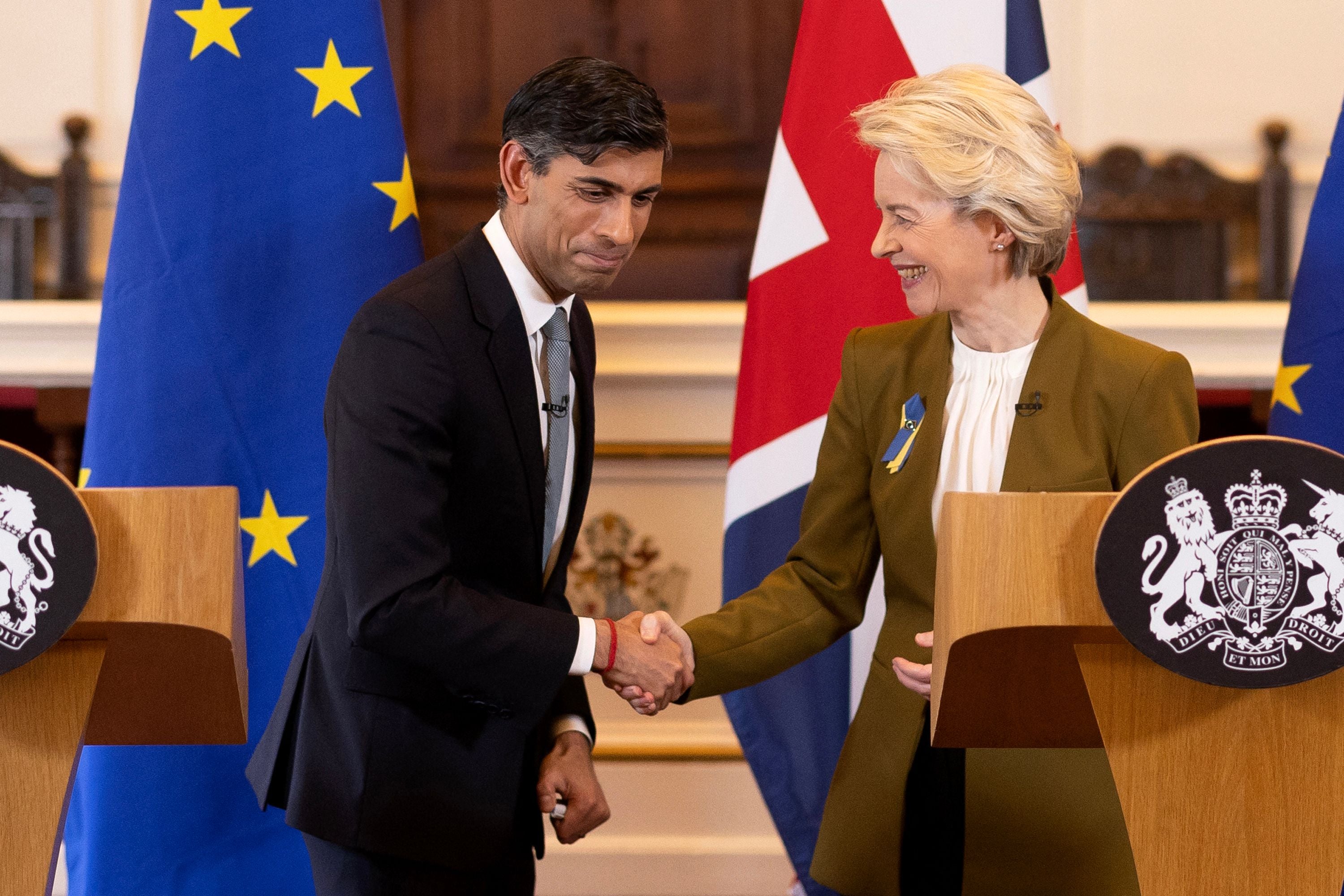Will Rishi Sunak’s Brexit deal revive his poll ratings?
‘Getting Brexit done’ has certainly not harmed the prime minister, says Sean O’Grady


Rishi Sunak’s surprise deal with the EU has attracted much praise, even from the most Eurosceptic of quarters. His supporters claim that he has succeeded where two predecessors have failed and “got Brexit done” at last. What also matters is what voters will think.
How will Windsor Framework affect Sunak’s ratings?
It will almost certainly improve them, given the blanket coverage and widespread acclaim for Sunak’s efforts. Such a boost is badly needed. A succession of disappointing economic news, strikes, scandals, sleaze and the background rumble of manoeuvrings by Boris Johnson consorted to push Sunak’s approval rating to an all-time personal low in January when some 27 per cent told Ipsos that they had a favourable opinion of the prime minister, compared to 46 per cent who viewed him unfavourably. One month earlier, 30 per cent held a favourable view of Sunak and 39 per cent unfavourable. Broadly, Sunak’s ratings were about the same as Johnson’s in his last days in power, although still superior to the record-breaking nadirs of Liz Truss.
Sunak also suffered a series of gaffes and bad luck that risked turning him into an object of ridicule, even one of pity. There was the fixed-penalty notice when he was filmed in his own car by his own team not wearing a seatbelt, which followed the excruciatingly stilted Christmas conversation with a homeless man – both of which echoed previous PR disasters such as apparently not knowing how to use a contactless payment card at a supermarket and pretending to drive a humble Kia Rio for a photo opportunity.
Sunak is more popular than his party, but that’s not saying much. Voters still tend to choose by party rather than by leadership personality, though it can be a factor, especially for the Liberal Democrats.
But isn’t Sunak polling better than Starmer?
No. On some personal measures, Starmer has edged ahead in recent months – notably on economic competence – though voters aren’t yet enthused by him; at a similar point in the electoral cycle in the 1990s, Tony Blair was a far higher-rated leader. Starmer scores higher on general approval than other senior political figures.
On other measures, such as who would be the best prime minister, Sunak and Starmer are roughly neck-and-neck. A recent Techne UK survey gave the Labour leader a six-point lead for “best PM” at 45 per cent to Sunak’s 39 per cent. The brighter points for Sunak are his popularity with older and “red wall” voters.
Will it reduce Labour’s lead?
Very unlikely. First, Northern Ireland is not an issue that drives voting behaviour across Great Britain. Policy on Northern Ireland tends to be bipartisan between Labour and the Conservatives and there’s no particular point in voting Conservative on the substance of the Windsor Framework because there is zero possibility Labour will reverse it.
Second, Northern Ireland as a political issue lacks “salience”; voters weigh issues such as the cost of living, public services and immigration more highly. As the last instalment of “getting Brexit done”, it might appeal to some Leavers as well as Remainers, but such labels are fading in importance given that Labour has pledged not to bring any other part of the UK back into the single market or customs union.
In short, there are no votes for Sunak in trying to revive power-sharing in Northern Ireland, even if it makes him look a little more statesman-like.
Is there any way ‘getting Brexit done’ could rescue the Tories?
Yes, and Sunak has said as much. He has begged his party not to turn the Windsor Framework into yet another crisis point. Like David Cameron, who once told his party colleagues to “stop banging on” about Europe, Sunak wants to move on. The issue has divided Tories to the point of civil war, and voters tend not to like divided parties. If the new framework quietens down the arguments about Europe, it ought to help the Conservatives seem more unified and competent. Their broader problem is that they are strongly defined as the party of Brexit but the electorate is increasingly disillusioned with it – 55 per cent think it has had a negative impact. Because of that, along with economic problems, scandals, and sleaze, many voters have long since made up their minds it is time for a change.
Join our commenting forum
Join thought-provoking conversations, follow other Independent readers and see their replies
Comments
Bookmark popover
Removed from bookmarks